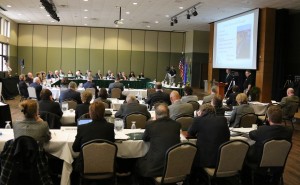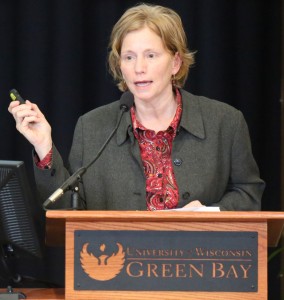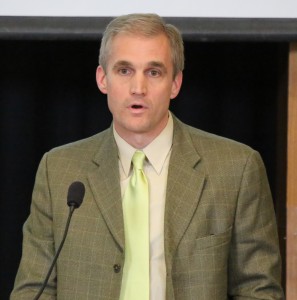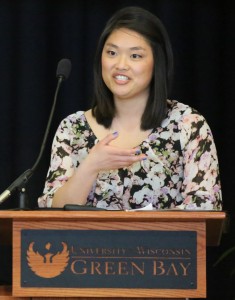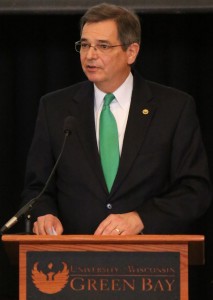GREEN BAY, Wis. – Student success in college is impacted by a myriad of factors, including student health, well-being and safety, according to a report presented Thursday to the University of Wisconsin System Board of Regents.
“It is a vital part of our commitment to students in the UW System that we meet their needs both in the classroom and outside the classroom, and that includes students’ physical health, mental health, alcohol and/or drug use, and safety. We recognize that these factors can play a very significant role in student success,” said Regent President Regina Millner.
In recent years, the UW System has participated in four surveys and samples to assess these factors: the National College Health Assessment-II (NCHA, 2015); UW System Counseling Impact Assessment Project (2011-2015); UW System Alcohol and Other Drug Survey (2004-2011); and Healthy Minds Study (spring 2012).
Those findings of those surveys
were part of a comprehensive overview presented by Alice Reilly-Myklebust, Director of Student Health and Counseling Services at UW-River Falls, and John Achter, Interim Associate Dean of Students, UW-Stout, at the Board meeting hosted by UW-Green Bay.
Highlights from the reports included:
- While national NCHA trend data shows the number of students nationally reporting a disability is generally increasing, the reporting rates among UW students are higher than the national figures, including rates for Attention Deficit Hyperactivity Disorder (ADHD), psychiatric conditions, chronic illness, and learning disabilities.
- Almost one-third of UW System students experienced clinically significant mental health symptoms measured over a 12-month period.
- Increasing numbers of UW System students (almost one-third) reported that they did not drink alcohol during the last 30 days (at the time of the survey), and most students (61 pe
rcent) reported drinking the same or less than before coming to college.
- According to national NCHA trend data, reported sexual assaults perpetrated on females have been increasing over the past seven years; reported sexual assaults perpetrated on males remained at a stable rate. For UW System females, the rate was 2.7 percent of the student body in the last 12 months (compared to 0.5 percent of males in the UW System).
- Utilization of counseling services on campus has been increasing at higher rates than enrollment growth at UW System campuses. Campus counseling centers were often unable to keep up with these growing needs, at times resulting in waiting lists.
- Reporting rates for suicidal and self-harming thoughts and behaviors were higher for students of color and Gay, Lesbian, Bisexual, Transgender, and Questioning (GLBTQ) students.
“These are complex, interconnected issues that cannot be addressed in isolation and require comprehensive environmental approaches,” said Reilly-Mykelbust.
Natasha Mykkanen, who will earn a M.S. in school counseling from UW-Stout next month, provided a first-hand account of how student counseling and other support services on campus gave her vital personal and academic assistance.
“Through these services, I was able to find myself,” Mykkanen said. “I was able to share my experiences for the first time, and not only do that in a safe place but I was also able to learn healing techniques.”
Madison Faculty Policies and Procedures approved by Education Committee
The Education Committee voted to recommend approval of amended UW-Madison Faculty Policies and Procedures (FPP) relating to faculty layoff.
UW-Madison’s presentation of its FPP follows on the Board’s approval last month of a new Regent Policy Document called “Procedures Relating to Financial Emergency or Program Discontinuance Requiring Faculty Layoff and Termination.”
UW-Madison Provost Sarah Mangelsdorf told the Committee that relative to many peer policies reviewed, “Our policy is a real tenure policy.”
Amendments to the UW-Madison FPP were developed to ensure its compliance and consistency with the Regent policy and state statute.
Regent Gerald Whitburn, chair of the Education Committee, shared that UW-Madison Chancellor Rebecca Blank, not in attendance at the meeting, had spoken to him earlier in the week, indicating her comfort with the proposed changes and her confidence that the resulting FPP will reassure her faculty.
UW-Green Bay is ‘50 and Forward’
Chancellor Gary Miller welcomed Regents to the UW-Green Bay campus as it celebrates its 50th anniversary this academic year.
Miller noted that the university’s founders believed that having a public university in Green Bay would bring substantial social and commercial value to the area. That charge continues, he said, and the university is “reshaping to add value to the efforts of businesses and communities to address the real challenges of northeast Wisconsin.”
Miller also reiterated the university’s ongoing and signature commitment to interdisciplinary studies. “We believe that this approach is particularly powerful for preparing students for the modern workforce,” he said.
As the university manages significant budget cuts, Miller said faculty and staff remain the institution’s biggest asset. He noted that in addition to university commitments, 75% of faculty and staff members engage in public service each week.
“What we’re really proud of at this university is the way we take dreams and make them into reality,” Miller said.
“The university should be the place that people go to if they have a problem in science, engineering and technology,” said John Katers, the dean of UW-Green Bay’s new College of Science and Technology.
Capital Planning and Budget Committee
The Capital Planning and Budget Committee approved UW-Madison’s request for authority to adjust the project budget and construct the Music Performance Building Project. The new two-story, 74,840 GSF facility will be known as the Hamel Music Center and will contain a 650-seat concert hall, a 320-seat recital hall, a large rehearsal room, a lobby, and support spaces, for the School of Music.
This project is funded by $55.8 million of Gift Funds, $5 million of which will be provided by the William Vilas Trust. The budget increase is necessary to provide additional acoustical work in the recital and concert halls and to cover increases due to inflation since the time of the project’s original enumeration in 2007;
In other business, the Capital Planning and Budget Committee:
- Heard a presentation by UW-Green Bay Interim Vice Chancellor for Business and Finance Sheryl Van Gruensven on the institution’s capital planning and projects for 2015-17;
- Approved UW-Eau Claire’s request for authority to construct the Garfield Avenue Corridor Improvement project and adjust the campus boundary accordingly. During the next two years, this project will reconstruct a portion of Garfield Avenue and replace the roadway surface, curb and gutter, sidewalk, lighting, and subsurface utilities. It will also renovate the nearby Roosevelt Avenue cul-de-sac, construct a campus gateway entrance, and provide replacement accessible parking;
- Approved UW-Madison’s request for authority to enter into a temporary land use agreement to allow the Sustainable Resources Institute, Inc. to construct a 4,500 GSF Education and Outreach Center at the Kemp Natural Resources Station, and to accept the completed facility as a gift-in-kind. This center will provide classrooms and related space to support the station’s research and instructional programs and also accommodate a wide range of other users such as UW departments, state and federal agencies, other universities, the forest industry, and the general public.
- Approved UW-Madison’s request for authority to enter into a new lease to provide office space for the College of Letters and Science Center for Healthy Minds, which is a global leader in conducting novel research to revolutionize understanding of the mind, emotions, and well-being. The center is expected to undergo significant growth during the next five years and this new space will provide its faculty and staff with adequate collaborative office space that is not available at its current location or elsewhere on campus;
- Approved UW System’s request for approval of five All Agency Maintenance and Repair projects totaling approximately $2 million at three campuses: UW-La Crosse, UW-Madison, and UW-Manitowoc. These projects address utility repair and renovation, programmatic remodeling and renovation, and energy conservation;
- Approved UW-Oshkosh’s request for authority to increase the budget of the Reeve Union Entrance and Expansion project, which addresses the accessibility of the building, its visual appearance, and space needs for student organizations. The increase is necessary to complete the originally approved scope of the project and to match recent bid results;
- Heard UW Colleges’ annual report on City and County Financial Support.
Research, Economic Development and Innovation (REDI) Committee
Jim Villa, UW System Vice President for University Relations, updated the REDI Committee on efforts for the Talent Development Initiative outlined initially in December, which called for providing a Wisconsin Business Experience for every junior and senior students in the UW System.
“At the heart of the goal and our effort is the desire to connect UW System students to Wisconsin businesses and the potential opportunities opened through their UW experience,” Villa said.
He highlighted plans to augment the current scope and effectiveness of campus/business outreach efforts and discussed efforts to expand these activities. He also previewed a System web portal that will allow convenient access for both employers and students with the ultimate goal of connecting them to available resources providing employers with access to talent and students with access to internships or work experiences.
UW-Green Bay presentation: UW-Green Bay Chancellor Gary Miller highlighted his institution’s commitment to community and business development and provided an update on a variety of economic development and community outreach initiatives, including the innovative and collaborative Engineering Technology program that UW-Green Bay is offering in conjunction with other UW System institutions.
In other business, the REDI Committee:
- Heard a report from Aaron Hagar, WEDC’s Vice President of Entrepreneurship and Innovation, providing an update on current initiatives and programs, with a focus on WEDC’s efforts to collaborate with the university and state businesses to foster entrepreneurial activities and business innovation.
Audit Committee
Chief Audit Executive Lori Stortz and audit directors provided a high-level overview of recently issued reports. UW-La Crosse representatives also discussed the Cash Handling Training and Certification Program they have developed and implemented.
In other business, the Audit Committee:
- Heard a report by Director Steve Mentel which provided an overview of the progress management has made toward resolving comments and implementing recommendations included in audit reports;
- Received an update from Stortz on audit plan progress for fiscal 2016 as well as other initiatives in the Office of Internal Audit.
Business and Finance Committee
The Business and Finance Committee approved tuition changes for certain non-resident and graduate programs at La Crosse, Milwaukee, Platteville, Stout, and Whitewater. The changes are sought to provide enhanced revenues to aid in managing challenges presented by the current fiscal environment. No changes are being sought for resident undergraduate tuition rates through these requests.
In other business, the Business and Finance Committee:
- Heard a presentation by Sheryl Van Gruensven, UW-Green Bay Vice Chancellor for Business and Finance, on “Business and Finance in a Transitional Time,” discussing how the institution is navigating the current fiscal environment;
- Approved a one-time transfer of $200,000 from the Tripp Trust Fund Income account to the Tripp Trust Fund-Brittingham House Maintenance account. The transfer will fund various non-routine maintenance work performed by UW-Madison Facilities Planning and Management staff in connection with the recent renovation of the facility;
- Heard a report by Doug Hoerr, UW System Trust Funds Director, including highlights of the 2015 Annual Trust Funds Report. As of June 30, 2015, the funds held net assets totaling $526.7 million, a decrease of $10.0 million from $536.7 million at the end of the prior fiscal year. Gifts received during the period totaled $10.4 million, up from the $10.0 million received in the prior period. Disbursements to benefiting UW institutions totaled $19.5 million for the year, versus $18.9 million for the prior period;
- Heard a report by Hoerr with highlights of the Quarterly Investment Report. Total Trust Funds net assets increased by $2 million during the quarter, from $495 million at September 30, 2015 to $497 million at December 31, 2015. The Long Term Fund returned 1.3% for the quarter (-2.4% for the full year), the Intermediate Term Fund returned 0.1% (0.9% for the year), and the Income Fund returned close to zero for the quarter (and only 0.1% for the year);
- Heard a summary of the annual benchmarking studies. Annualized returns for UW Trust Funds lagged peers in the one- and three-year periods ending June 30, 2015, essentially matched the five-year return for funds its size. For the 10-year period, the UW Trust Funds significantly exceeded the average returns of its peers;
- Heard a summary report comparing budgeted to actual revenues and expenditures through the third quarter of fiscal year 2016;
- Approved a Fee for Service agreement between UW-Madison and Agilis Biotherapeutics, LLC. The agreement involves the manufacture and phase 1 clinical trial of therapeutic substances intended to address a rare inherited genetic disease that causes progressive damage to the nervous system. Work under the agreement is expected to be performed from June 1, 2016 through March 19, 2019. The institution is expected to receive $1,515,000 under the agreement;
- Approved an agreement between UW-Eau Claire and Sodexo Operations, LLC to provide dining services at the institution. The contract would be effective June 1, 2016 for a one-year period, with the option for nine one-year extensions. Estimated annual net revenue to the vendor is approximately $11.4 million, totaling approximately $114.0 million over the potential life of the agreement. Estimated commissions to the institution over the life of the contract are approximately $8.02 million. In addition, the vendor is expected to invest $3.6 million in campus facilities.
Education Committee
The Education Committee recommended approval of a request by UW-Superior for a proposed School of Business and Economics, which represents a name change with no change in existing functions and units within the existing Department of Business and Economics at UW-Superior. The department is being elevated to a school to be led by a director. The School is not adding new academic degree programs.
In other business, the Education Committee:
- Approved a Master of Social Work and Master of Science in Computer Science at UW-Whitewater;
- Approved a Bachelor of Science and Bachelor of Arts in Geospatial Analysis and Technology at UW-Eau Claire;
- Approved a Master of Science in Health and Wellness Management, a collaborative degree involving UW-Parkside, UW-Green Bay, UW-River Falls, UW-Stevens Point and UW-Superior with support from UW-Extension;
- Approved a Bachelor of Science in Data Analytics at UW-Stevens Point;
- Approved a Bachelor of Science in STEM Middle Childhood-Early Adolescence Education at UW-Platteville;
- Approved a Bachelor of Science in Secondary Education; Bachelor of Science in Early Childhood Education; and Bachelor of Science in Special Education at UW-Parkside;
- Approved a request from UW-Madison and UW-Milwaukee to the trustees of the William F. Vilas Trust Estate for $7,039,281 for fiscal year 2016-2017 in support of scholarships, fellowships, professorships, and special programs in Arts and Humanities, Social Sciences, Biological Sciences, Physical Sciences, and Music;
- Heard a presentation by Provost Greg Davis on signature interdisciplinary programs at UW-Green Bay and the institution’s interdisciplinary advantage in the educational marketplace.
Joint meeting of Audit Committee and Business and Finance Committee
Members of the Legislative Audit Bureau (LAB) staff involved with the audit of the UW System presented LAB Report 16-3, “University of Wisconsin System,” providing an unmodified opinion on UW System’s financial statements for fiscal years 2014-15 and 2013-14.
An Independent Auditor’s Report on the financial statements and other reporting required by Government Auditing Standards also was presented to committee members.
***
Photos by Daniel Moore/UW-Green Bay | More photo highlights from Day 1 meeting
The UW System Board of Regents will resume its meeting at 9:30 a.m., April 8, at UW-Green Bay.

